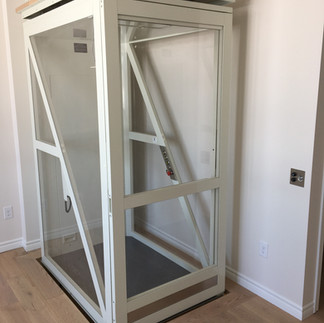Home Elevators: A Great Investment for Your Future
- Suzanne Hallam

- Apr 23, 2025
- 4 min read
Updated: May 9, 2025

When planning to age in place, many homeowners focus on kitchen and bathroom updates or smart home technology. But for those living in multi-level homes, mobility between floors can become one of the biggest challenges. What was once considered a luxury is now recognized as a necessity; home elevators offer a practical solution that supports long-term independence, safety, and property value. Installing one can be a proactive step toward staying comfortably in the home you love, without having to compromise.
Is a Home Elevator Worth It? What to Know About Value, Budgeting
As 25% of our population in Canada reaches the age of 65 in the next 5 years, the concept of aging in place is becoming not only more popular but also necessary. Homeowners are rethinking how to make their homes accessible without sacrificing style. One major upgrade being considered more often is the residential elevator.

Is adding a home elevator to your home worth the investment?
We spoke with Eric LaChance from Silver Cross, a trusted Canadian provider of accessibility solutions, about how elevators are helping clients maintain independence while adding long-term value to their homes.
Why More Homeowners Are Considering Elevators
The potential for falling is actually built into homes right from the beginning if you think about it. More three and four-story townhomes are being built every day
As mobility changes as we get older, staircases become one of the most common challenges and hazards in the home. Installing an elevator removes those barriers and allows multigenerational families with older members or seniors themselves to remain in multi-level homes they are otherwise happy with.
An elevator can improve the quality of life at home in a multitude of ways for the whole family. It is a great way to assist with heavy lifting, getting groceries from the garage to the main floor or laundry from the bedrooms upstairs to the basement laundry room, not just moving people between floors.
An elevator or lift can be invaluable for those who have progressive conditions like arthritis or vision changes that can make stairs hazardous, people who use mobility aids, family caregivers assisting aging relatives, or families managing a temporary or long-term injury. It's not just about convenience, it's about maintaining control over your living environment.
What to Expect During an Installation

According to Eric, an installation always begins with an assessment and walkthrough of the home. The contractor assesses the layout of the home, looks for structural considerations, and determines where an elevator or a lift might make the most sense for the space.
Some common installation spots include stairwells, garages, and shared walls between floors. Contractors evaluate what type of elevator will best suit the space, hydraulic, traction, or pneumatic, and work with the homeowner to understand the differences between the types available. Then the homeowner's preferences, including door styles, finishes, and interior design coordination, are taken into account to customize the look. Some people want it to look just like a closet, others love the glass on 3 sides to have a modern look.
Maintenance and Safety
Modern home elevators come with multiple safety features built in, such as backup power systems for outages, door interlocks, and emergency alarms. Maintenance is minimal but essential: most systems require annual inspections and routine servicing to keep them operating smoothly.
How Much Does It Cost?
The cost of a home elevator depends on several factors:
Size and number of floors: More floor level stops typically mean higher costs are involved.
Type of elevator: Hydraulic elevators are common but require more space; pneumatic models are more compact but often pricier.
Custom features: Finishes, smart controls, and doors can be tailored to suit your home's look, but will add to the overall cost.
Permits and labour: Municipal permit fees and construction labour also play into the final budget.
On average, residential elevators can range from $25,000 to $40,000 for a basic installation, and more if you're customizing finishes or choosing luxury models. However, remember these kinds of home modifications are also eligible for government tax rebates in Ontario.
Budgeting Tips and Financial Planning
If you're exploring the option of investing in a home elevator, consider the following:
Start with a professional consultation to help you understand realistic costs based on your home’s structure.
Get quotes from a few reputable installers to compare costs and understand what’s included.
Investigate Ontario grants and tax credits that can reduce out-of-pocket spending for accessibility upgrades.

Think long-term savings! Investing in an elevator now can provide excellent future proofing in your home, increase your home’s value, and help avoid the future costs of moving or assisted living.
Download our FREE Your Accessible Home Aging in Place Budget Planner from our website for a clearer picture of how to break down expenses and prioritize upgrades over time.
The Value of Investing in Your Future

While a stair lift or ramp might be more affordable in the short term, they’re not always the best long-term solution. Elevators provide greater flexibility, especially for homes with more than two levels or layouts where ramps aren’t feasible. Certain situations may also require both a ramp or a lift from the garage level to the main floor and then an elevator from there.
Installing an elevator can also improve your property value, especially if you're in a neighbourhood where accessibility is top of mind. With aging populations and multigenerational living on the rise, buyers are starting to see a home elevator as a really practical, future-ready feature, not just a luxury item.
Think Installing an Elevator Might be Right for You? Let’s Talk.
Our team can help you understand if an elevator is the right choice for your home and how to plan for it. Book a virtual consultation to get started, and don’t forget to download our FREE resources!
















Comments